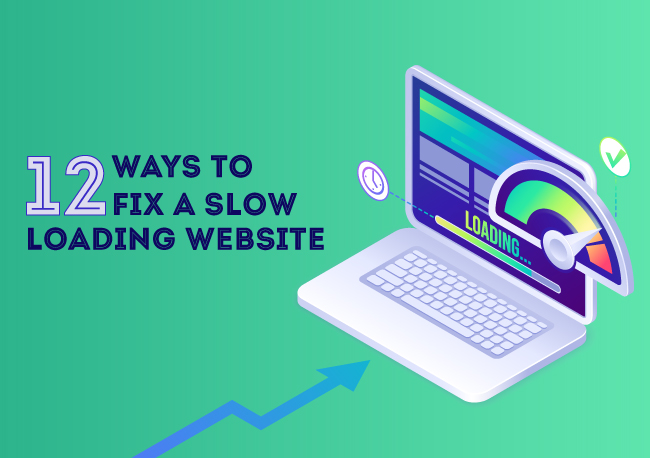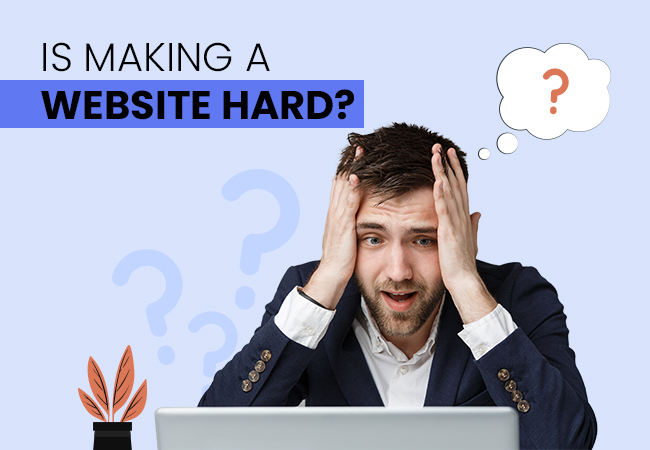Simple Ways to Fix a Slow Website
Let’s Make Your Website Quick!
1. Unoptimized Images
The high volume of unprocessed images is often the most common reason for websites slowing down. High-resolution images can consume a lot of bandwidth while uploading. Uploading large images and downloading them can unnecessarily increase the size of your webpage – causing your website to load slower.
This is true no matter what CMS and website builder you are using. The image format is another important factor to consider. For example, JPEG images are much smaller in size compared to other image formats such as PNG or GIF.
Your webpage will load faster if you use JPEG images instead of PNG / GIF.
Also Read: Website Optimization Tips To Increase Website Performance
2. JavaScript Issues
The availability of JavaScript / jQuery plugins has made it easy to add dynamic content to websites. However, if used incorrectly, JavaScript may disable the loading speed of your webpage. It takes time for jQuery & JavaScript to be loaded, translated, and used.
So, if you use multiple API calls to provide JavaScript / jQuery data, it may cause significant delays while loading web pages.
3. Too Much Flash Content
While Flash is a great tool for adding interaction to your website, it may also play a role in slowing down your page. Flash content tends to be larger and if the file size becomes larger, your pages will load less. Reducing the size of your Flash files or removing them altogether can greatly improve your page load speed.
If you intend to speed up your website, you should consider some HTML5 methods to replace your existing Flash content.
Also Read: Importance Of Mobile-Friendly Website & How Do You Make It?
4. Excessive HTTP requests
Having lots of JavaScript, CSS, and image files can result in too many HTTP requests. When a user visits your webpage, the browser makes a few requests to upload each of these files – which may significantly reduce page load speed.
You should combine CSS & JS files instead of making the browser locate several CSS and JS files to load and combine them in one file. Also, If some images are space-consuming, it’s advisable to remove them as it will also reduce the HTTP Requests.
Also Read: Best Practices To Secure Your Website
5. Too many Ads
There is no doubt that the ads displayed are good for monetizing through high-traffic websites and growing results in your advertising report. But that should not come at the expense of serious operating or user experience. Don’t let too many ads become another reason to slow down your website! The most obvious effect of overloading your website with ads is the addition of HTTP requests, which may require more processing time.
In particular, rich media ads – such as pop-ups, interstitials, and auto-downloads – can create hundreds of HTTP requests and make your website unresponsive.
Summarizing things, limiting the number of ads displayed will ensure better performance of your website. However, there may be creative options without restrictive ads. The Solitaire-based team, for example, has tried to load ads based on time delays when users start playing their solitaire game. As a result, page speed has improved and they have been able to save on advertising revenue.
Also Read: 10 Common Reasons For A Website Crash
6. Storage Strategies
The cache is known to improve website performance by jumping and blocking. If you do not stop for a moment, you miss. It is a strategy that allows you to save frequently used data points in ‘archived memory’. Any subsequent requests for the same content are found in the cache memory, thus speeding up the entire data recovery process.
By using browser / HTTP caching and server-side caching, you will likely find significant improvements in the performance of your website.
7. Messy code
Another common reason for websites slowing down is to insert unclean codes. When you make your website, extremely white spaces, inline styles, new blank lines, and unnecessary comments can make a website style page grow larger.
By removing these unnecessary items, you can compress the code, reduce the file size and improve the page load time and if you follow the steps, you will probably see improvements in your SEO performance as well. In technical terms, this process is known as minifying. If you are not comfortable with coding, several online tools can be used to clean and trim your style sheet files. Or, you can use your hand to help other IT service providers.
Also Read: Ways To Optimize Your WordPress Website For Speed
8. lightweight theme
A good theme with many media features may look ridiculous but if not optimized for speed, and large, it can affect your WordPress performance. Make sure you use a lightweight theme for your website and that no other major themes in your WordPress take up server space. This will ensure that your WordPress site uploads quickly and without hindrance.
Also Read: Difference Between Parent Theme & Child Theme In WordPress
9. Update your site regularly
Be sure to update all sections of your website regularly, including WordPress, themes, and plugins. The main reason is that updated versions are always ready to work. This will help your website to save faster loading time. Additionally, updated versions often contain known vulnerabilities that will help protect your website from malware.
10. CDN Service
The CDN service is a distributed network of independent servers deployed in different geographical areas, which can provide web content to visitors with high availability and high performance.
Depending on your visitor’s location, the requested content is assigned to a location available at your nearest available data canter. It will reduce the return time (RTT) and provide the requested content in no time.
Also Read: How Does Server Location Have An Impact On Your Website SEO?
11. gZIP compression
By allowing gZIP compression, you command the server to wrap all web objects (images, CSS, JavaScript files, etc) in a single container before being sent to the requested browser. Pressure reduces response time by reducing the size of the data transmitted between your server and the visitor browser, which in turn helps to deliver the requested content much faster.
12. Choosing the right hosting
Your web hosting provider makes a huge difference when it comes to website performance. Yes, your slow page loading speed may not be your fault.
If you have tried to fix all the causes listed above and yet your website seems to be responding slowly, changing your hosting provider may solve your problem. Choose a web hosting provider that provides performance enhancement services at a hosted price.
Also Read: 5 Things Small Business Should Know About Web Hosting
Conclusion
Slow websites can cause visitors to leave your website suddenly. To avoid that, you need to make sure your website is loading quickly. Many factors affect the speed of your page. We have included the most common ones in this article to ensure that you can identify the problem and correct it if necessary.



